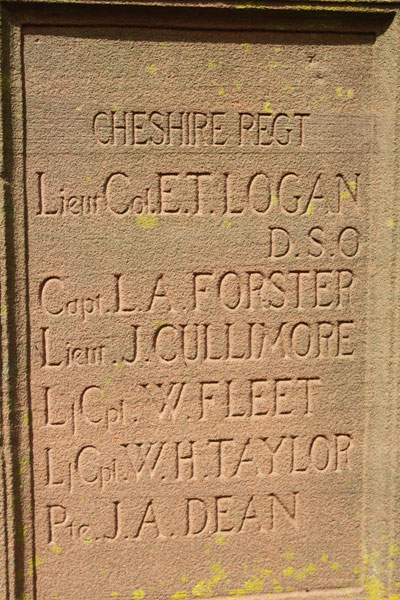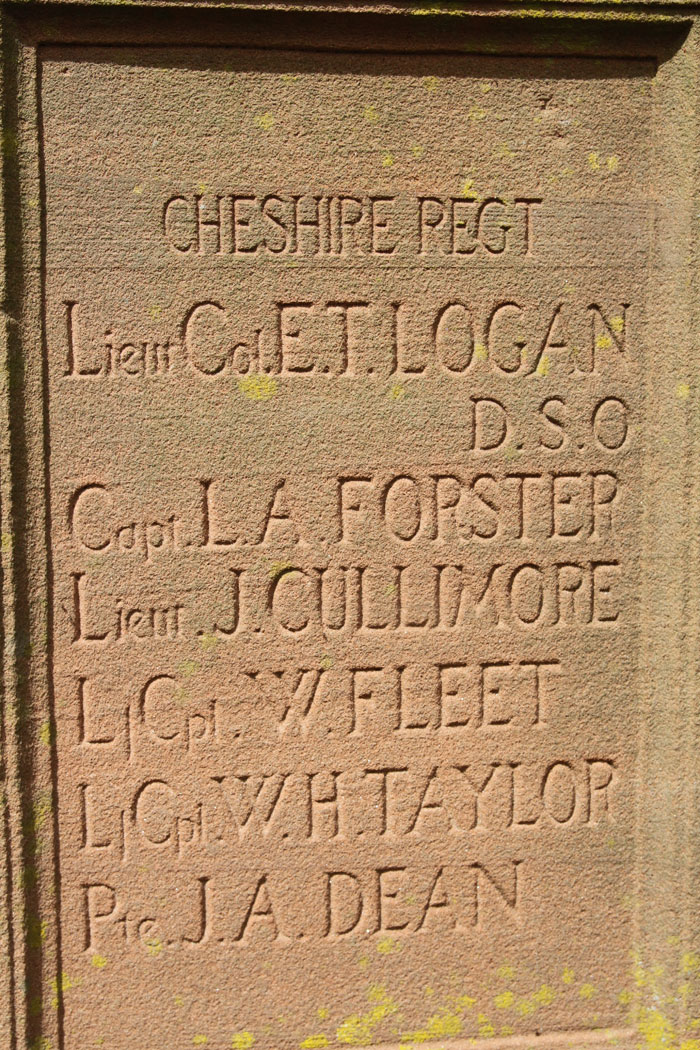Lionel Archibald Forster
Late Captain Forster
-

Christleton Memorial
The following text comes from “Grandads War” and we have added to it with further research in Chester by Nigel Meyrick and the Cheshire Military Museum
Lionel was born at Bamford Speke, Devon on 16th March 1879, the youngest son of the late Right Hon. William Forster, MP of Sydney New South Wales. Australia. The 1891 Census shows him as a 13yr old pupil at Sandhurst, and born in London. (1891 RG 12/1008) He married Ione in 1905/6 and the 1911 Census (RG 14/21845) shows him as a serving office, living at the Old Hall, Guilden Sutton with his wife and one daughter Daireen aged 1. Lone later re married becoming Ione Toms and went to live at Holmesgrove Road, Westbury on Trym, Bristol. Currently his Army Records are unavailable, and do not appear to have survived the WWII bombing. His “Roll of Honour” entry shows that he was gazetted 2nd Lieutenant, Cheshire Regt on 3rd August 1898 and promoted to Lieutenant on 23rd October 1899, and Captain on 15th October 1905. He served in the South African (Boer War) 1900-02 and was awarded the Queen’s South Africa Medal (3 clasps) and the King’s South Africa Medal (2 clasps)
Lionel was not part of the original contingent of the 1st Battalion that left for France in August 1914, having retired from the active list and joined the Reserve of Officers. However his medal index card and the War Diary show that he joined the Battalion on the 24th September at Le Mesnil from the Reserve of Officers. Captain Forster was listed as “wounded” in the War Diary on 22nd October following the action at Voilaines so it seems he subsequently became a prisoner of war and died of wounds two weeks later at the Lycee Hospital, Douai. (Crookenden p.29, states he was wounded and “died…in German hands”.)
After the action at Voilaines, 22nd October 1914, the War Diary reports:
"5.10 a.m. Enemy made heavy attack, and took the trenches at the point of the bayonet. Battalion retired to RUE DU MARAIS under very heavy fire. Manchesters came up in support.
8.00 p.m. Battalion withdrawn and went in bivouac at last E of RUE DE BETHUNE.
Casualties: Captains Shore, Rich, Hartford*, 2/Lieutenants Atkinson, Leicester, Greenhalgh missing, Captain Forster, 18 N.C.O.s & men wounded, 200 N.C.O.s & men missing including Sergeant Major."
*Captain Hartford a personal friend of Captain Lionel was killed in the same battle, and is commemorated by a Memorial in the Lady Chapel at St James, Christleton.
The Times Tuesday, 02/12/1919, page 16, Issue 42272; col F
Reported wounded and a prisoner of War 19/12/1914. He died of wounds 04/11/1914 but it wasn’t reported until June 1915.
See also: Second Lieutenant Forster, John and Lieutenant Forster, Alfred Henry
Note: There appear to have been three sons killed in The Great War.
For an officer he left an unusually low £99 18s in his will to his widow.
Cheshire Observer Report; Saturday December 19th 1914
Gallant Cheshire N.C.O. carries wounded officer
Brave attempt at Rescue, Surprised by the Germans
How Captain Forster of the 1st Battalion Cheshire Regiment was wounded while leading his men near La Basse, and how when hurt, his first thoughts were for the Lance Corporal who made a gallant attempt to carry his officer to safety, were incidents of a thrilling narrative, related yesterday to a former “Observer” reporter now on the staff of the Nottingham Daily Guardian, by Lance Corporal Williams at present at his home in Nottingham, he having been wounded at Ypres.
Among the innumerable names to be inscribed upon the scroll of fame of the Cheshires, that of Captain Forster will surely rank high. The plucky attempt by the Lance Corporal to rescue the captain under a hail of bullets, and when hard pressed by a bayonet charge maintains that reputation for individual bravery in action, which distinguishes the county regiment.
Lance Corporal Williams tells the story in his own words as follows.
It was towards the end of October and near a village outside La Basse. About 1.30am Captain Forster said to D company they had to retire into some trenches further back. Well we retired and while we were digging a new trench the Captain asked for a Lance Corporal and 3 men, and I was the Lance Corporal that accompanied him. I went straight away and I was just looking up to see if there were any snipers about when I saw them coming in thousands. “Make for yourself”
I said “Good God here they are in their thousands, but Capt. Forster only replied “You are delirious my lad” No sooner had he spoken then they charged us.
The Captain drew his revolver and fired, but he himself was shot in the act of firing. I got hold of him, put his arm around my shoulder and started to carry him. The Germans who outnumbered by ten to one were charging with fixed bayonets, and firing and I could hear the bullets whistling over my head.
A little way down the village he was shot again through his right shoulder, and I could see he was badly hurt. He said “Let me down and make for yourself, it is no use two of us going for one” I let him down, and I ran as fast as I could, for the Germans were then only twenty yards away.
He was a fine officer and never acknowledged defeat. When I left him he was bleeding from the back and chest, having been shot in the lungs. I did my best to get him out of it, but I saw it was no good. At the end of the village the Dorset’s re-enforced us but by that time only about 30 of the battalion remained, and they pushed the Manchester’s up in motor cars to help us.
Tribute to the Cheshire’s
The same night while in the trenches, the General addressed us and said he was proud of us, and he also said “You will always find Cheshire’s on my right” We were under a great soldier, who also spoke in high terms of his troops, and praised the whole brigade. We were in a division which the French called “The Fighting Fifth”
Lance Corporal Williams comes from fighting stock, his father having been a Sgt. Major in the Notts - Derbyshire Regiment and formerly fought in the service of Lord Roberts in India. As a footballer Williams will be remembered as Cammel Lairds goalkeeper, and he also turned out for Tranmere Rovers. Asked for his impressions, he favoured the interview with many interesting sidelights from the point of view of a “British Tommy” The French Girls call us “The Saviours of France” he remarked.
He spoke of the Ghurkhas and produced with pride a somewhat gruesome souvenir, a knife taken from the death clasp of a Sikh. “The Niggers” as Tommy calls the Ghurkhas and Sikh’s go into action with a squeal” said Williams, and it is a weird experience to see them and the whistling and slashing of their steel as they get into close quarters, hooping the hoops over shells.
Our blokes love the niggers out there, but we cannot help laughing at their talk. There is not one of them that wouldn’t give their life for a British Tommy, and the way they bare pain when injured is marvellous. I once saw one of them come hobbling up from the trenches with half his foot blown away, and he was grinning like a Cheshire cat, saying “German’s no good”
We have copied the story verbatim from the Newspaper and some of the language used in the report would not be acceptable today. We have used it as a historic document of the period.
Cheshire Observer Reports from January 1914, 19th December 1914
“Grandads War”
Cheshire Battalion War Diary
David Cummings Christleton Villages; Great War Voices; Remembering our Forgotten Heroes.
Nigel Meyrick
Cheshire Regiment Museum The Castle, Chester
HEROES TOGGLE



